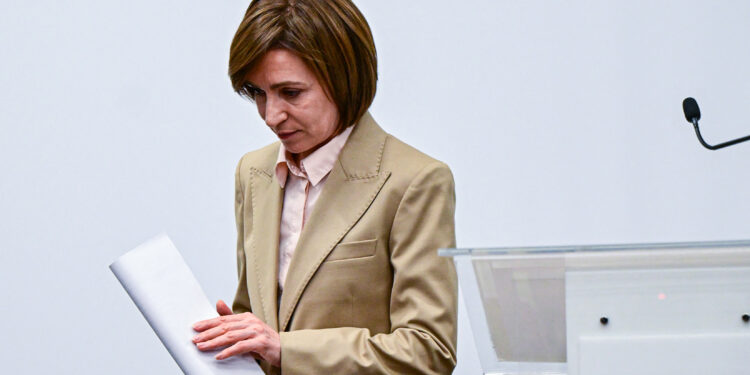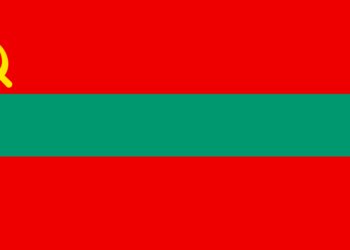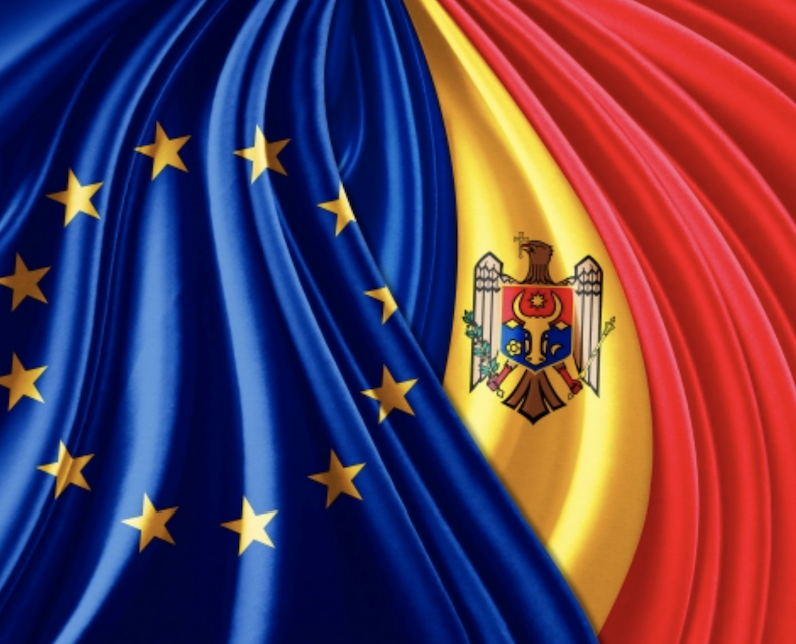Brussels – With a razor-thin majority, Moldovan citizens decided that their country’s future lies in joining the European Union. The “yes” vote in the people’s referendum on membership passed in the lead on Monday morning (Oct. 21), the day after the polls closed, and it appears that the boost came from residents abroad. However, presidential elections were also held Sunday: outgoing president Maia Sandu, a pro-European who has repeatedly denounced Russian interference in the national democratic process, is in the lead but will have to go to a runoff in two weeks.
Chisinau to Brussels
It seemed like it was already time to sing the dirge of Moldova’s European ambitions, with the front opposed to EU entry of the small East European country seeming to have a clear lead until the early hours of Monday. However, in the final stretch, there was a turnaround driven by votes from abroad, counted only at the end, and votes from the capital, Chisinau, which arrived at dawn today. Throughout the night between Sunday and Monday, the “no” vote in the referendum remained firmly in the lead (with a percentage ranging between 55 and 57). However, the situation reversed – at least according to preliminary data from the Central Election Commission.
The distance between the two sides runs on a razor’s edge but is enough for the pro-European front to win: 50.39 versus 49.61 percent, with over 99 percent of the votes counted. The gap would be a few thousand votes, just over 11 thousand out of a total population of 2.5 million. The voter turnout was well above the threshold required for the referendum to be valid (33.3 percent), with more than half of the eligible voters (51.68 percent) going to the polls.
The referendum asked citizens whether to insert into the Basic Charter the former Soviet republic’s commitment toward integration into the European club. Specifically, the preamble to the Constitution should now be enriched with two new paragraphs to “reconfirm the European identity of the people of the Republic of Moldova and the irreversibility of the European path” and to “declare integration into the European Union a strategic goal of the Republic of Moldova.”
Russian Shadow
According to many observers, the success of the anti-EU front was allegedly also due to a heavy campaign of interference orchestrated by Moscow, which has every interest in keeping Moldova away from Brussels. When the “no” vote in the referendum was still in the lead, Sandu accused “criminal groups” linked to the Kremlin of interference with the vote to prevent the former Soviet republic from leaving the Russian orbit. “We have clear evidence that these criminal groups have attempted to buy 300,000 votes,” she said, adding that the aim was “undermining a democratic process” and “spreading fear and panic in society.”
From Brussels, she was echoed by the EU executive’s foreign affairs spokesman, Peter Stano: “We have noted that this vote has taken place under unprecedented interference and intimidation by Russia” and other actors traceable to the Federation, he said during a press conference, “aiming to destabilize the democratic processes in the Republic of Moldova.” After all, this is hardly a surprise. “This foreign interference and manipulation of information” by the Kremlin “has many faces, and it is happening in many forms not just a few days before the vote,” Stano added, speaking of “a long-term effort” that came into the Commission’s crosshairs “a long time ago.” At the beginning of the month, Moldovan authorities dismantled a massive vote-buying scheme, which they traced back to the meddling of oligarch Ilan Shor, who is close to Moscow and currently living in Russia. Last week, they foiled another plot involving more than a hundred young people who had allegedly received training from private Russian military groups on how to create riots at last Sunday’s double vote.
The European aspirations of the incumbent leadership
A pro-Western government has led Moldova, a former Soviet republic, since 2021, with pro-EU President Maia Sandu elected the previous year.
Executive and head of state are attempting to unseat the Balkan nation from what Russian President Vladimir Putin continues to consider the Federation’s “sphere of influence.” For decades, Chisinau has been grappling with the separatists of Transnistria, a piece of land on the border with Ukraine, which auto-proclaimed itself independent in 1990 and continues to challenge Moldovan sovereignty and territorial integrity thanks to Russia’s support.
In March 2022, Moldova applied to join the EU along with Ukraine and was granted Candidate Country status in June of that year, again in tandem with Kyiv. Last December, the European Council gave the green light to formally launch accession negotiations, a decision that materialized in June this year with the first intergovernmental conference.
Presidential runoff
Sunday’s election date was double: in addition to casting their vote on Chisinau’s European future, Moldovans were also called to choose the new head of state, who is to take office when the term of the outgoing president, 52-year-old Sandu (next December) expires.
The current president (the first woman to hold that post, already the first female minister for a few months in 2019) won 42.31 percent of the vote when the polls were almost complete, which placed her solidly in the lead but did not allow her to achieve a second term in the first round. She will now have to challenge pro-Russian candidate Alexandr Stoianoglo (who won 26.09 percent of the votes) in the runoff scheduled for Nov. 3.
English version by the Translation Service of Withub






